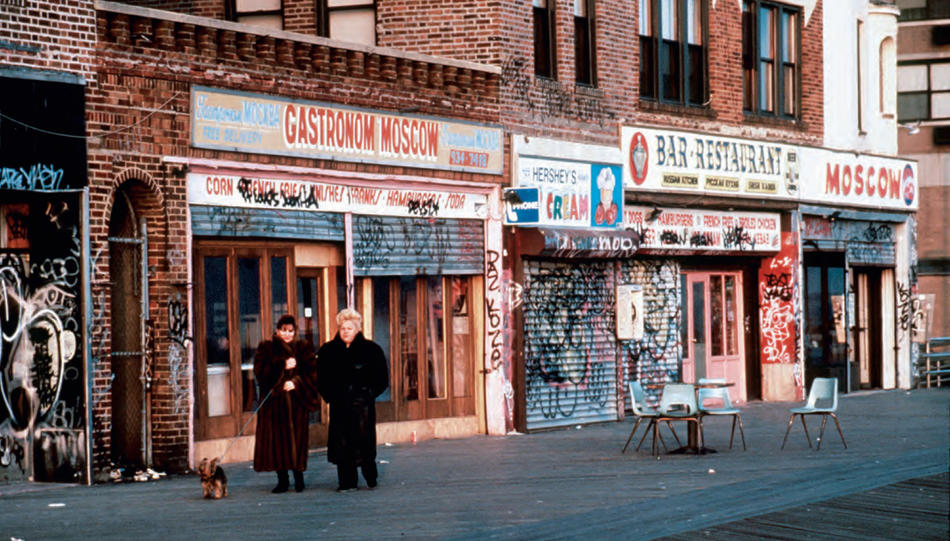Much excitement has been generated recently about a young writer named Yelena Akhtiorskaya ’09SOA and her debut novel, Panic in a Suitcase, which the New York Times named one of its hundred best books of the year. But perhaps the most telling endorsement comes from the writer Aleksandar Hemon, who selected Akhtiorskaya for the National Book Foundation’s “5 Under 35” award: “I’d read a take-out menu written by Yelena Akhtiorskaya,” he writes.
Indeed, though there is plenty of interest in the plot of Panic in a Suitcase, which follows two generations of a Ukrainian family as they immigrate — or don’t — to Brooklyn, Akhtiorskaya’s glorious, hilarious prose is very clearly the star of the show. With an almost Nabokovian flair and efficiency, Akhtiorskaya manages to convey more in each sentence than most writers can in a chapter, and in such a pleasing way that it’s difficult not to dog-ear each page and highlight every paragraph for revisiting. Even casual descriptions are memorable: “Headaches were like electronics-store flyers — you had one before you realized you had one,” for example, or “the trouble with cherry pits was their clotted bloodiness and that they carried the ugly secrets of mouths.”
The book centers on around the Nasmertovs, a Jewish family who migrated from Odessa to Brighton Beach just before the fall of the Soviet Union. Robert and Esther, who were both physicians in Odessa, aren’t practicing in New York, which seems to affect them both viscerally: Esther gains a great deal of weight; Robert becomes gaunt. Their daughter, Marina, cleans houses for Hasidic families who “wouldn’t have hired [her] were she not Jewish, but neither did they consider her Jewish.” Son-in-law Levik disappears into a cave of computers and public-television programs. Everyone’s hopes are pinned on Marina’s daughter, Frida, a sturdy nine- year-old preoccupied with her “recently activated nipples.”
The family has been in Brooklyn for 715 days (“they were still counting, though it was getting less clear to what end”) when Esther is diagnosed with cancer. Marina sends a ticket home to Odessa for her brother, Pasha, a promising poet languishing in indecision and inertia: “If he’d been smart, he would have been born at least half a century earlier into a noble family and spent his adult life hopping between tiny Swiss Alp towns and lakeside sanatoria.” Rather than emigrating, Pasha had taken the if-you-can’t-beat-them-join-them route, converting to Christianity to “stifle his genetic tendencies before they stifled him.” Still, Marina and her parents are hoping to convince Pasha to follow them to Brooklyn. “You can sit on the sofa in the corner,” says Esther in the most spot-on Jewish-mother plea of all time, “No one will bother you. We just want to look at you.” But Pasha is in no hurry, and not just because he can’t face the mountain of paperwork. He doesn’t see America in the same way his family does. Or, at least not the pseudo-America that they inhabit in the Russian speaking enclave of Brighton Beach, as he explains in a passage that perfectly sums up the strange paradox of immigration:
His fellow countrymen hadn’t ventured bravely into a new land, they’d borrowed a tiny nook at the very rear of someone else’s crumbling estate to make a tidy replication of the messy, imperfect original they’d gone through so many hurdles to escape, imprisoning themselves in their own lack of imagination, forgetting that the original had come about organically and proceeded to evolve, already markedly different from their poor-quality photocopy. Such a bubble, no matter how enthusiastically blown, would begin to deflate in no time.
Pasha’s convictions about America don’t stick — he even submits his visa paperwork — but he never actually moves, and his sense of displacement, despite the fact that he never lives anywhere but Odessa, is one of the distinctions that set the book apart from the archetypal immigrant novel.
Sixteen years later, divorced from his first wife, who has commandeered the family’s seaside dacha, he’s resigned himself to life in Odessa, “land of ambiguous lung disease,” with a new lover, the perpetually nightie-clad Sveta, and a rotating cast of visiting relatives. One of those relatives eventually turns out to be his niece, Frida, now grown and seeking refuge from the medical-school career — and the country — that was forced on her.
Like Frida, Akhtiorskaya was a young girl when her family came from Odessa to Brooklyn. With this novel, she joins an elite group of writers from this new wave of Soviet immigration of the 1980s and 1990s, including Lara Vapnyar and Gary Shteyngart, both of whom write about similar themes with similar dark humor. It’s a thought-provoking and deeply entertaining subgenre, and with her imaginative prose, Akhtiorskaya is already proving herself integral to its future.



